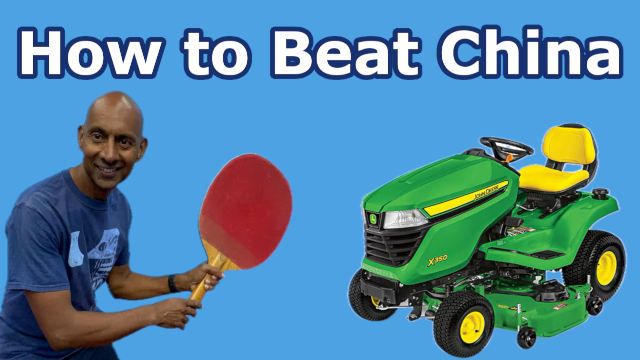China Dominating
Discussion
Hammad Hammad Asked 13 years ago
Hi coach,
I was following olympics and was wondering the domination which China players have over the players of the rest of the world. it looks impossible to reach the level upon which they are standing. Can any other country in the world may stand in front of them as a strong opponent? why Australia or japan or korea are not able to give them a proper hard time. every time when china plays with another country, why we feel from very beginning of the match that china is going to win?
thnx
 Alois Rosario Answered 13 years ago
Alois Rosario Answered 13 years ago
Hi Hammad,
Take a look at our video on Chinese Domination. I've included it as a video answer below.
This will answer some of your questions for you.
They were absolutely fantastic at the Olympics. It is amazing to see how one country can be so far ahead of the rest of the world.
Recommended Video
How to Beat China at Table Tennis (Kind Of…)
China has dominated world table tennis for decades — with unmatched skill, speed, and dedication. So how do the rest of us compete with that level of greatness?
Well… Coach Alois might just have the answer. And yes — it involves a ride-on lawn mower. 😄
Is it genius? Is it madness? Watch the video and decide for yourself!
Watch NowThoughts on this question
Become a free member to post a comment about this question.

Rahul Kumar Posted 13 years ago
They all mostly use the penhold grip...
Hi Rahul,
I don't think that's true anymore. Zhang Jike, Ma Long and Wang Li Qin all use the shakehand grip. Wang Hao, Xu Xin and Ma Lin use the penhold grip.
Hammad Hammad Posted 13 years ago
i think having a penhold style is not the key of success. the key is their determination . someone playing from the age of 5 years and giving 6 hours a day to it, he will definitely become Ma lin and Zhang Jike :)
douglas harley Posted 13 years ago
i have been to china a couple times, and i can say that table tennis there is *MUCH* more popular there than anywhere else i have ever been. i hadn't yet started playing table tennis at the time of my visits in 2000 and 2004, but it was impossible not to notice the popularity, and penetration of the sport. there was considerable coverage on television (live matches, as well as analysis, and instruction), and concrete tables in almost all public parks and outside apartment complexes. with somewhere around 20 million competitive players, and probably hundreds of millions of recreational players, there is a lot of talent to draw from. additionally, because it is so popular, there is considerable pressure to perform, so that raises the levels of players and coaches. finally, with the structure of their society, and their dedicated sports schools, promising players and coaches have a government-supported means to completely immerse themselves in table tennis, for the majority of their lives.
in short, to me it is more remarkable that the chinese aren't more dominant!
Jonathan Huynh Posted 13 years ago
It's a shame Australia isn't as Table tennis crazy as the rest of us, but at the least the clubs are great! The advantage is that there isn't that many australian tt players so you could rise quickly quickly through the ranks. not that it's not going to be diffcult, just not as diffcult as the chinese level.
Jonathan Huynh Posted 13 years ago
Wait, are there any sweden players that might be the new Waldner!!!???
I don't know of any.
Jonathan Huynh Posted 13 years ago
any from germany? Japan? Korea? Any country? Have those countries who are good at Table tennis team up, train together and make tactics as a combinded force. Then we could really see some pressure on the chinese!
They do sometimes have combined camps but it is difficult even with the combined effort to match the dominance of the continued and consistent progress of the Chinese program.
Jonathan Huynh Posted 13 years ago
what if china offers to share some of they're knowledge?
Arnon Thaicharoen Posted 13 years ago
I don't think it's as simple as knowing "chinese-only secret method". I believe every competent coach knows the theory. It is just the implementation of the theory that is problematic. Just like agriculture. Sure, you don't need to do agriculture to have good fruits/vegetable: by chance, there will be some. But if you do practice agriculture, you can be sure of the amount and quantity of the supply.
China is successful in this regards. They promote the sports while other countries just "enjoy" the success of occasional successful TT players. There is simply little or no support for TT players.
Arnon, thanks for those thoughts. It is a nice summary and well said.
Duncan Wraight Posted 13 years ago
Enjoyable blog-video guys.
Have either of you read Bounce by Matthew Syed? He tries to dismiss the myth of the "talent" theory of excellence and talks about hours of purposeful practice. He's keen to make the point that "just practice" won't make a difference; it's both quality and quantity of practice that makes successful players.
I think that's one thing that the Chinese have always done well, and that the rest of the world are only now catching up to. I believe it was the Chinese that first had the idea of Multiball for instance.
I read somewhere that they dedicate "practice players" to analysing and imitating the style of non-Chinese table tennis players so that the top Chinese players can practice against, for example, a replica of Timo Boll's style and characteristics. In addition, the very top players will play against practice duos - two players that have played as a team for a number of years, where one plays the forehand shots and the other plays the backhand. This allows even the world number one to play against "better" opponents, as that's one of the best ways to improve.
HI Duncan,
I have read Bounce and enjoyed. A lot of his principles are also in a Malcolm Gladwell book titled "Outliers". Here is a blog Jeff wrote about the book.
I do like the principles. I think training is the single most important factor to a players success and yes the Chinese are very good at that.
Here is a link to the Blog by Jeff:
“Outliers” by Malcolm Gladwell – Book Review
Duncan Wraight Posted 13 years ago
Thanks Alois. I'll investigate Outliers.
What's your opinion on "talent bands". You must've taught some youngsters/adults that "just can't get it", or are some players simply slower to learn than others?
Must also be quite frustrating for you to see youngsters give up seemingly easy when everything doesn't go immediately to plan.
Hi Duncan,
There is always a difference in how quickly players pick things up. I think often this is related to how many different experiences they have had up to that stage. It may have been different sports they have played or just different opportunities they have had to explore hand eye coordination exercises over their life.
As for players that give up, I suppose I just accept it now. I used to become frustrated especially when players that seemed to be doing well, gave it up. My attitude now is that players need to have an inner desire to improve. If that isn't there, then everything becomes difficult. You can encourage them when things aren't going well but ultimately it needs to come from them.
Jonathan Huynh Posted 13 years ago
how long do the chinese juniors train?